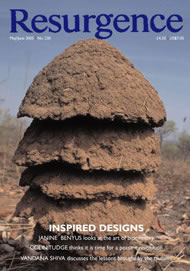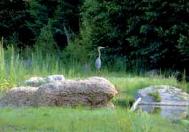I AM STANDING beside the San Francisco River, in New Mexico. Eastwards stretches the Gila Wilderness, an unspoiled world of pine, juniper and oak forest, mountains and canyons, bald eagles and bears.
Now I must wade knee-deep, feet sinking into fine gravel, and walk several miles along a rough track, crossing the river six more times. There's no other way. It's a rite of passage.
Not just because there's no road; nor because the people who live here dislike visitors, although the peace of this canyon - former home of the ancient Mogollon ('Sweet Medicine') tribe - is precious to them. But so that I open fully to my surroundings. With pace slowed, senses awake, when I arrive I shall be in harmony with the wrens and squirrels who are already announcing my coming. This is orientation, Step One.
Step Two is a trench latrine. No hand-dryers roaring here. Just chocolate-brown earth, breeze on bare skin, the rustle of leaves. Here, my consciousness tunes to the rhythms of Nature breathing, pulsing, within and around me.
Many people talk of coming here. Those who do, often return, drawn by the simplicity and authenticity of this place.
That's what I'm seeking, half fearing I won't find it. The world has many dodgy teachers and self-styled shamans. And my cynic's nose for fakery, hypocrisy and tinsel-trails to enlightenment would spot a false prophet with one sniff.
I want to meet Jesse Wolf Hardin, whose face and flaming beard I've only seen in photographs. I want to encounter this ageing tearaway-turned-teacher, ex-monkey-wrencher who wandered the roads in an old school bus until, a quarter-century ago, he fell deeply in love with this canyon and sold the bus engine for a down payment.
The bus is still there, but now invisible. Like moss enveloping a fallen tree, a cabin grew up around it, incorporating it so deeply that, like Jesse himself, it became part of the canyon.
As the canyon slowly transformed him, Jesse deepened into his art, his writing, his teaching of "Earthen Spirituality". The transformation was reciprocal.
No new vegetation was growing along the river. Cattle, their hooves compacting the soil, ate any new shoots. Weeds crowded out indigenous plants, decreasing biodiversity. So Jesse began chasing cattle daily from his canyon, and things started growing again.
He planted baby willows and cottonwoods and reintroduced cattails and clump grass to the barren river edges. Piece by piece, plant by plant, he worked to restore what had once been a rich, riparian wilderness. Aided by a $40,000 government grant, he fenced eighty acres. With cattle permanently excluded, the re-wilding project gathered momentum, led by Nature herself.
"Each new season," says Jesse, "increasing numbers of plants make their way back home here. Every Spring comes the sound of another bird species I've never heard. With every reintroduction the land becomes…more itself."
Photographs of this restoration eventually helped persuade officialdom to fence the entire river.
It's evening. I'm sitting in Jesse's study. Loba, his wife, has fed us a simple satisfying meal. She uses many wild plants in her cooking: nettles, cattails, acorns, dandelions, purslane, clover…all delicious. Now she lights candles, smudging us with the smoke of sweet herbs, as Jesse speaks of how he, like the canyon, has regained lost parts of himself: "the willingness to laugh and the ability to cry…My inner animal, and the reason for being. The inclination to play, and the patience to stay. The longer I'm here, the better I can hear the will and whisperings of the Earth…and the more myself I am."
So are Loba and the project's third co-director, Kiva Rose. They've become teachers, healers, guides for the groups of women who gather here. Sure-footed as deer, they lead the women up mountain trails, create a holding space for their wilderness vision-quests, then bring them safely down, into the hot, fierce mystery of the sweatlodge.
Everything here is as I'd hoped. Small wonder that the local folk, albeit conservative-minded ranchers, have taken these people into their hearts and their community. Authenticity wins friends.
Everything here is simple, low-tech - except the laptop and satellite connection. No TV or fancy gadgets. A solar panel lights the kitchen; they cook with propane. Outside stands an old bathtub over a wood fire. Often, they sleep under the stars. Everyone here walks their talk. The hand-built cabins are unobtrusive, like birds' nests. Human presence rests lightly, gives more than it takes.
The work of the Project is to teach this way of living, leading people back - or rather, forward - into reconnecting with Gaia, living simply, and becoming fully alive human beings, dwelling gently and co-operatively on the Earth.
I've found what I sought. The successful re-wilding of a place; a perfect place for the re-wilding of people.
For more information please visit www.earthenspirituality.org .
Jesse Wolf Hardin's latest book is Gaia Eros: Reconnecting to the Magic and Spirit of Nature (Career Press, USA, 2004, US$14.99).
Marian Van Eyk McCain is the author of The Lilypad List. www.elderwoman.org .







